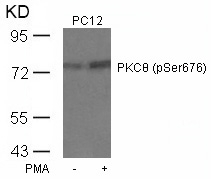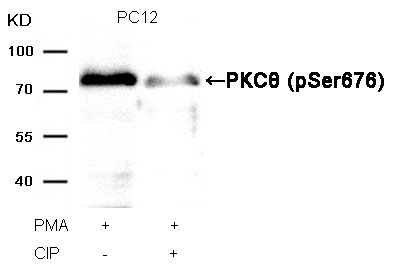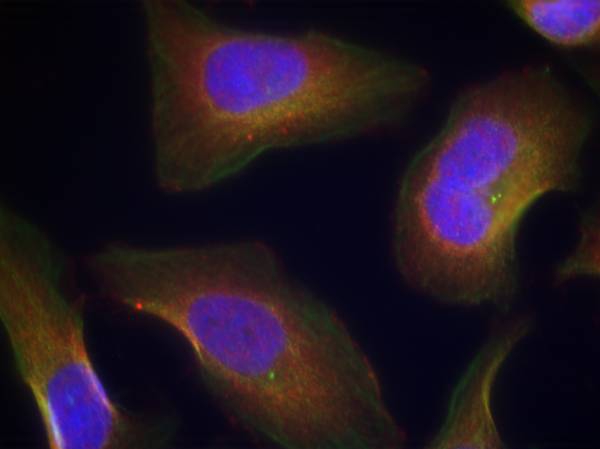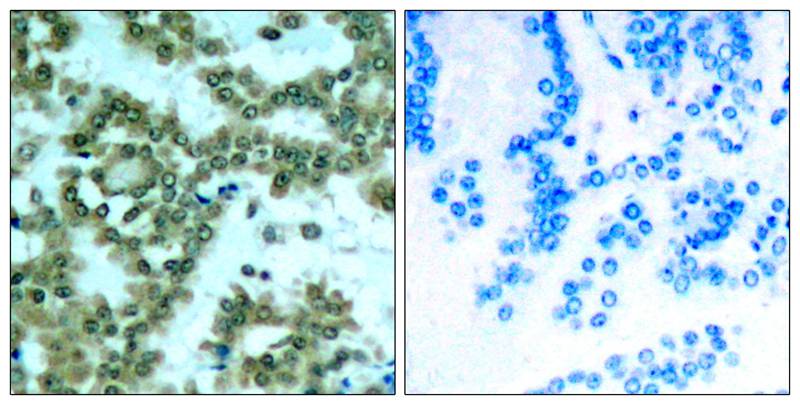



| WB | 咨询技术 | Human,Mouse,Rat |
| IF | 咨询技术 | Human,Mouse,Rat |
| IHC | 1/50-1/100 | Human,Mouse,Rat |
| ICC | 1/100-1/200 | Human,Mouse,Rat |
| FCM | 咨询技术 | Human,Mouse,Rat |
| Elisa | 咨询技术 | Human,Mouse,Rat |
| Aliases | KPCT; PKC-theta; PKCQ; PRKCQ; PRKCT |
| Entrez GeneID | 5588; |
| WB Predicted band size | 80kDa |
| Host/Isotype | Rabbit IgG |
| Antibody Type | Primary antibody |
| Storage | Store at 4°C short term. Aliquot and store at -20°C long term. Avoid freeze/thaw cycles. |
| Species Reactivity | Human,Mouse,Rat |
| Immunogen | Peptide sequence around phosphorylation site of serine 676 (R-L-S(p)-F-A) derived from Human PKCth. |
| Formulation | Purified antibody in PBS with 0.05% sodium azide. |
+ +
以下是关于PKCθ(Phospho-Ser676)抗体的3篇代表性文献示例,供参考:
---
1. **文献名称**:*"Selective activation of protein kinase Cθ in T cells through phosphorylation at Ser676/Ser681 by the immune synapse"*
**作者**:Monks CRF et al.
**摘要**:该研究利用Phospho-Ser676特异性抗体,证明T细胞受体(TCR)激活后,PKCθ在Ser676位点被磷酸化,并定位到免疫突触。抗体验证了PKCθ在T细胞活化中的空间调控机制。
2. **文献名称**:*"PKCθ signaling in T cell activation: A target for therapeutic intervention"*
**作者**:Isakov N, Altman A.
**摘要**:综述PKCθ在T细胞信号通路中的作用,强调Phospho-Ser676抗体的应用在检测PKCθ激活状态中的重要性,并讨论其在自身免疫疾病中的潜在治疗意义。
3. **文献名称**:*"Phosphorylation of PKCθ at Ser676/Ser681 regulates Th17 differentiation and autoimmune inflammation"*
**作者**:Liu Y et al.
**摘要**:通过Phospho-Ser676抗体研究PKCθ磷酸化在Th17细胞分化中的作用,发现其磷酸化水平与IL-17表达正相关,为炎症性疾病机制提供新见解。
---
**说明**:以上文献为示例,实际引用需通过PubMed、Google Scholar等平台检索具体研究。建议使用关键词“PKCθ Phospho-Ser676 antibody”或“PKC theta phosphorylation Ser676”查询最新文献。
The PKCθ (Phospho-Ser676) antibody is a specialized tool used to detect the phosphorylated form of Protein Kinase C theta (PKCθ) at serine residue 676. PKCθ, a member of the novel PKC subfamily, plays a critical role in T-cell signaling and immune response regulation. It is predominantly expressed in T lymphocytes and skeletal muscle, where it participates in pathways activated by T-cell receptor (TCR) engagement, co-stimulatory signals, and cytokine receptors. Phosphorylation at Ser676 is a key post-translational modification associated with PKCθ activation and membrane translocation, essential for its function in downstream signaling cascades, including NF-κB and AP-1 activation. This modification typically occurs during T-cell activation, influencing processes like proliferation, cytokine production, and immune synapse formation.
The PKCθ (Phospho-Ser676) antibody is widely utilized in immunological research to study T-cell activation mechanisms, autoimmune diseases, and cancer immunotherapy. It enables specific detection of the activated PKCθ form in techniques such as Western blotting, immunofluorescence, and flow cytometry. Its development has advanced understanding of PKCθ's regulatory role in immune responses and its potential as a therapeutic target. Researchers also employ this antibody to explore aberrant PKCθ signaling in conditions like rheumatoid arthritis, lupus, and T-cell malignancies, providing insights into disease pathogenesis and treatment strategies.
×